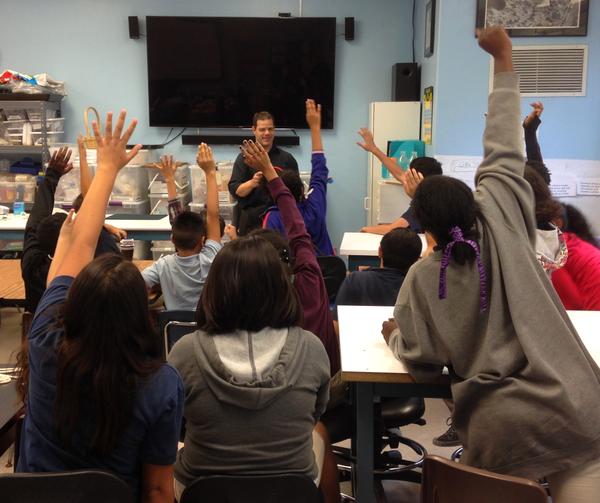
by Theodore Bruni
The Poetic Youth partnership that I am currently involved in provides weekly poetry workshops to San Diego Global Vision Academy (SDGVA) in the Normal Heights neighborhood of San Diego. My prior experience of teaching includes being a camp counselor and tour guide for over five years. Thus far, I have learned a wonderful amount of information about communication, community, and teamwork. For example, one exercise my team and I did with the youth at SDGVA was called, “Don’t Say the Feeling, Write the Feeling.” First, I had the students describe their morning – this particular day had been Halloween and they were dressed up so I gave them a chance to describe the way their character would feel throughout the day. If the character felt happy because they knew they were going to trick-or-treat in the evening, they would write, “I feel happy because I am going to get candy tonight.” I then asked the students to circle any emotion or feeling they wrote. In this instance, the feeling would be the word happy. After they have selected the word, the students are presented with the challenge of describing the feeling/emotion they chose without using the word they circled. So instead of saying “I feel happy.” They would write, “I felt like that moment right after you take a bite of warm apple pie and wash it down with hot chocolate.” This exercise encouraged the students to think in more poetic terms about every day feelings and emotions.
This activity ties into Poetic Youth’s mission, which aims to provide poetry workshops to under-served communities in San Diego. Adjusting my own personal relationship with poetry was the first challenge I encountered, but I knew I could figure that out relatively fast. The more difficult task entailed selecting the community that I wanted to work in. I chose to work with 8th graders at a charter school on the east side of San Diego, and I began to prepare myself for dealing with the obstacles that could arrive from working with students on the verge of entering high school and adult life. But thanks to my fantastic team, we have been able to effectively reach out to the youth in our Poetic Youth partnership. Every member of the team has an extremely different dynamic and we intertwine our various strengths in all facilitation sessions that we conduct.
As a group, we meet six hours or more weekly to prepare for out poetry workshops. Through many routes of inspiration; our professor, literary text, personal experience, and the Internet, we create lesson plans based on different themes of literature and grammar. One week was alliteration, the next week focused on elevated writing, and now we are working on a public speaking workshop to help prepare our young poets for a poetry reading at San Diego State University. What I discovered through poetic engagement in the classroom is powerful yet simple – never underestimate the healing power of words. The students are receptive to every writing activity, even the ones where I doubted their willingness to interact. It has been quite the experience to watch as a classroom full of complete strangers change into a setting where individuality, diversity, and emotions are respected on many different levels.
Through weekly workshops, I am learning what poetry means to me. I am also becoming aware that poetry exists without constraints. Disassembling social stigmas associated with poetry was another personal mission I set for my externship with Poetic Youth. When I am going into the communities I am serving, I remind myself, “I am willing to give more that what I am expecting to receive.” This is essential for the foundation of a powerful poet, and as I continue onward to serving more communities of San Diego through Poetic Youth, I aspire to reach out to every youth that feels a disconnect with poetry and show them that poetry is in everything.
